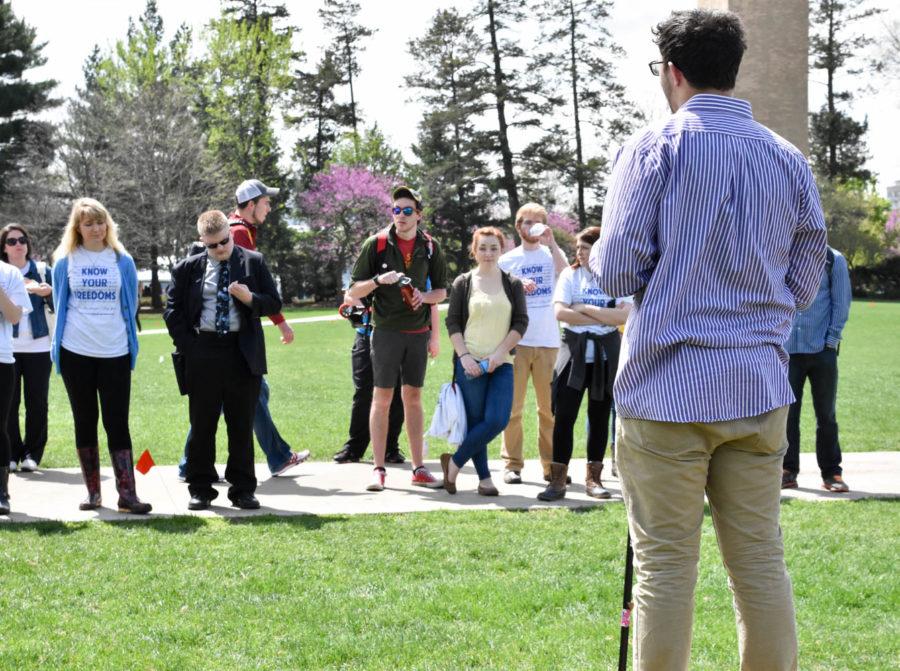Understanding the Bill of Rights
Michael Day, senior in industrial design, discusses his background at First Amendment Day on April 21. Day participated in the Voices Campaign where he spoke in-depth about his diversity.
April 10, 2017
When the Founding Fathers sat down to write the Constitution, it wasn’t taken into consideration that language would change and that the everyday Americans don’t understand politicians. The Bill of Rights spell out important rights to all Americans. In attempting to decode and translate what each means, misunderstanding and confusion muddies the waters and leads to misinterpretation.
https://www.billofrightsinstitute.org/founding-documents/bill-of-rights/
First Amendment
Normal people language: It is unlawful to pass any form of legislation banning or restricting speech, press, assembly, religion or petition of the government.
So what: There are a lot of lines blurred about public schools and the First Amendment. Court cases throughout the years (ie: Tinker vs. Des Moines) have clarified that the line is drawn when the speech delivered is disruptive to the normality of a school day.
Second Amendment
Normal people language: the right to protect the nation and for people to possess weapons.
So what: There is a lot of controversy surrounding gun rights as far as placing strict or loose laws on them. On one side, advocates are saying that due to the recent uproar of violence around the nation people need to be restricted on purchasing guns. On the other side, it is argued that having guns is a God-given right and the government has no right to try and stop people from using them.
Third Amendment:
Normal people language: prohibits soldiers from residing in private houses without the consent of the house owner during times of peace.
So what: While this quartering soldiers isn’t practiced much anymore, the Third Amendment is still there for privacy of Americans.
Fourth Amendment:
Normal people language: protection from unreasonable search and seizures, requires a warrant.
So what: In order for a police officer to search and/or arrest you, they must provide probable cause to a judge to receive a warrant. This is especially important in modern day due to the police brutality accusations and cases surfacing.
Fifth Amendment:
Normal people language: protection against being charged for a crime until correctly identified by the police; guarantee that all states in the nation must respect your rights.
So what: Created to officially declare our independence from Europe, the Founding Fathers felt the utmost importance to explicitly state that there are rights to protect you from the government.
Sixth Amendment:
Normal people language: right to a speedy trial, right to have an attorney provided if one so chooses and the right to see who is making accusations against you in the court of law.
So what: The court of law is a sticky scenario to walk around as the differences in citizens is so vast: everyone has their own situation, story, etc. Providing a set of basic laws to protect everyone makes certain that everyone is receiving fair treatment.
Seventh Amendment:
Normal people language: promises trials held in the federal courts have a full jury; states that cases that cost less than a certain amount will not be handled in federal courts; guarantees that by going to court automatically guarantees recognition from the government.
So what: Piggybacking on the idea that everyone is protected from the government and all laws apply to all citizens, the Founding Fathers knew it was important to have a fair court system due to the history of outlandish trials in Europe.
Eighth Amendment:
Normal people language: freedom from cruel and unusual punishment.
So what: Some would like to argue that the death penalty (or capital punishment) falls under the realm of cruel and unusual punishment due to the fact that placing the power to take a human life in the hands of the government can lead to social injustices by targeting certain races.
Ninth Amendment:
Normal people language: states that there are indeed other laws that exist other than those stated, but it does not mean that they can be violated.
So what: Instead of just limiting their power, the Ninth Amendment is primarily used to block the government from monopolizing and expanding their power.
10th Amendment:
Normal people language: any power not explicitly given to the federal government is reserved for the people and/or the states.
So what: States receive rights that allow them to govern the way they would like. For example, each state has the right to maintain law and order within their own state.







